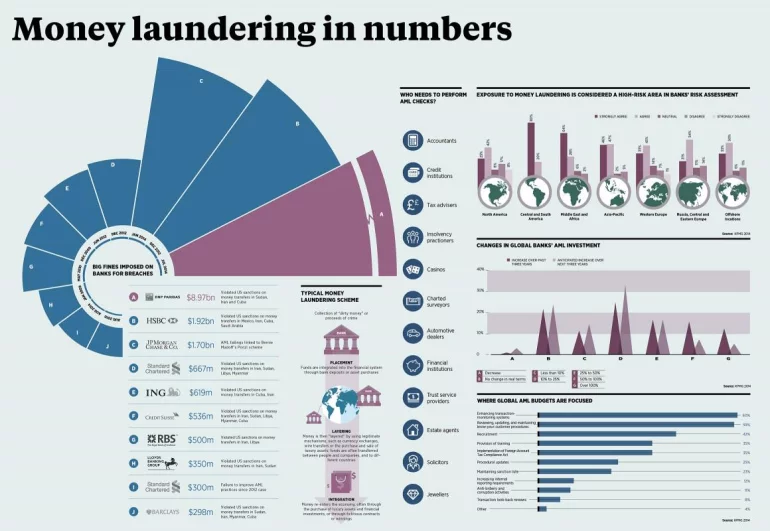
Money laundering is a scourge that plagues the global financial system, enabling a wide range of criminal activities to flourish. And in recent years, one area that has become increasingly vulnerable to these illicit schemes is the online gambling industry.
With their cross-border reach, anonymous transactions, and rapid fund transfers, Internet casinos have become a prime target for money launderers looking to integrate their "dirty" money into the legitimate economy. Criminals are exploiting the vulnerabilities inherent in many online gambling platforms to cycle illicit proceeds through betting and gaming activities before withdrawing the funds as ostensibly legitimate "winnings."
The scale of this problem is staggering.
Estimates suggest that annually, $800 billion to $2 trillion is laundered globally. It is equivalent to 2-5% of the world's GDP.
A significant portion of these funds is believed to be passing through online casinos, fueling the expansion of organized crime networks and undermining the integrity of the financial system.
In this article on Casinoz, we'll explore the mechanics of money laundering at online gambling, the regulatory efforts to combat it, and the emerging technological innovations enabling and disrupting these illicit practices. By shining a light on this growing threat, we hope to spur greater vigilance, collaboration, and action to protect the industry and the broader economy from the corrosive effects of money laundering.
What Is Money Laundering?
First, let’s explain what we will talk about in the article.
Money laundering means disguising the origin and ownership of money or other assets obtained through illegal means, such as drug trafficking, fraud, or corruption.
The goal is to make these illicit funds appear from legitimate sources.
Money laundering is a significant issue for several reasons.
- Scale and impact: This global problem facilitates various criminal activities. Above, we have already mentioned the estimated amount of money laundered globally every year. This massive scale of illicit funds enables further criminal enterprises and undermines the integrity of financial systems.
- Funding for organized crime: It allows criminal organizations to reinvest their illicit proceeds into expanding their operations, whether drug cartels, terrorist groups, or other sophisticated criminal networks. This fuels an ongoing cycle of criminal activity.
- Economic distortion: Money laundering can lead to economic distortions, as criminal elements inject large sums of dirty money into legitimate businesses and asset markets. This can increase prices, create unfair competitive advantages, and destabilize economies.
- Reputational damage: High-profile money laundering cases, especially when they involve reputable financial institutions, can severely erode public trust and the reputation of the broader financial system.
- Regulatory challenges: Combating fraud requires substantial effort and coordination between financial institutions, law enforcement, and regulatory bodies across different jurisdictions. Criminals constantly adapt their methods to evade detection.
Ultimately, the pervasive nature of money laundering undermines the integrity of financial systems, fuels further criminal activity, and poses significant risks to the stability of national and global economies. This is why it remains a major priority for governments and financial regulators worldwide.

Why Are Online Casinos Vulnerable to Money Laundering Schemes?
Online casinos can be particularly vulnerable to money laundering schemes for several reasons:
- Anonymous transactions: Internet casinos often allow customers to deposit and withdraw funds anonymously or under assumed identities, making it easy to conceal the source of money. This anonymity can mask illicit origins.
- Cross-border operations: Many web casinos operate across multiple jurisdictions, taking advantage of differences in regulatory frameworks and making it harder for authorities to track and monitor financial flows.
- Rapid fund transfers: The speed and ease with which funds can be transferred in and out of virtual casino accounts enable criminals to cycle dirty money through the system quickly.
- Complexity of transactions: The ability to make bets, play games, and transfer funds between accounts and different casinos adds intricacy that can obscure the audit trail for financial regulators.
- Lack of oversight: Online casinos may have weaker know-your-customer (KYC), and anti-money laundering (AML) controls compared to traditional financial institutions, leaving gaps that criminals can exploit.
- Use of emerging technologies: The rise of cryptocurrencies and other novel payment methods in online gambling further complicates tracking and tracing financial activities.
Criminals can use these vulnerabilities to deposit illicit funds, make bets, or engage in other gambling activities and then withdraw the "winnings" as apparently legitimate funds. This allows them to launder money efficaciously through online casino transactions. Addressing these vulnerabilities requires robust regulatory oversight, stringent KYC and AML policies, and close collaboration between online casino operators, financial intelligence units, and law enforcement agencies. Ongoing vigilance is crucial to stay ahead of evolving money laundering tactics in the online gambling space.
How Does Money Laundering Work at Online Casinos?
At the heart of the growing problem of money laundering in the online gambling industry is a well-established criminal playbook. Leveraging the unique vulnerabilities of internet-based casino platforms, savvy criminals have developed sophisticated schemes to integrate their ill-gotten gains into the legitimate financial system.
Here is an overview of how money laundering can work at online casinos.
Depositing illicit funds into online casino accounts
The first step in money laundering at online casinos is depositing the illicit, or "dirty," funds into casino accounts. Criminals have several methods for achieving this:
- Anonymous e-wallets or cryptocurrency accounts can be used to make deposits, obscuring the source of the funds.
- Structuring smaller deposits to avoid raising suspicion or triggering reporting requirements.
- Exploiting lax know-your-customer (KYC) and anti-money laundering (AML) controls at some online casinos.
- Utilizing money mules or other intermediaries to distance themselves from the initial deposit.
The goal is to get the illicit proceeds into the online casino's financial system in a way that makes the source appear legitimate.
Placing bets or playing games to create an appearance of legitimate gambling activity
Once the funds are deposited, criminals will engage in gambling to create a paper trail of "winnings." This can include:
- Placing large bets on table games or high-stakes slots;
- Engaging in a pattern of wins and losses to make the betting activity seem more realistic;
- Transferring funds between different casino accounts or associates to further obscure the money trail.
The objective is to generate gambling records and account activity that make the illicit funds appear to be the results of legitimate wins rather than the product of criminal activity.
Withdrawing "winnings" as clean, legitimate funds
Finally, the criminals will withdraw the funds from the online casino, now portrayed as lawful gambling winnings. This allows them to integrate the dirty money into the regular financial system. Withdrawal methods can include:
- Requesting wire transfers or checks payable to the account holder.
- Transferring funds to bank accounts or e-wallets that are not directly tied to the criminal.
- Cashing out through third-party payment processors to further distance the money from its origins.
By the end of this process, the illicit funds are effectively "laundered" and can be used for any purpose without raising suspicion of their criminal source.
This cycle of depositing, gambling, and withdrawing allows criminals to seamlessly integrate their dirty money into the legitimate economy through online casinos. Addressing this vulnerability requires robust regulatory oversight and stringent AML controls within the online gambling industry.
Regulatory Efforts to Combat Online Casino Money Laundering
As the scale and sophistication of money laundering activities at online casinos have grown, regulators worldwide have stepped up their efforts to combat this threat to financial integrity. Governments and oversight bodies have implemented a range of know-your-customer (KYC) and anti-money laundering (AML) requirements designed to enhance transparency, verify customer identities, and flag suspicious financial activity within the online gambling industry.
However, enforcing these regulations across global online casino operations' diverse and interconnected landscape presents significant challenges. Differences in jurisdictional frameworks, information-sharing protocols, and the rapid pace of technological change have all created vulnerabilities that clever criminals continue to exploit. Addressing this complex, cross-border issue will require sustained international cooperation and a commitment to staying ahead of evolving money laundering tactics.
This section examines the key regulatory initiatives, their strengths and limitations, and the ongoing struggle to protect the online gambling sector from the corrosive impacts of illicit financial flows.
Know-Your-Customer and Anti-Money Laundering Requirements for Online Casinos
In response to the growing threat of money laundering in the online gambling industry, regulators have implemented a range of KYC and AML requirements for casino operators. These measures enhance transparency, verify customer identities, and flag suspicious financial activity. KYC policies mandate that online casinos collect and verify detailed customer information, including personal identification, contact details, source of funds, and intended gambling activity. AML protocols then require casinos to monitor transactions, detect potential red flags, and report any suspicious activities to the appropriate financial intelligence units. The specific KYC and AML requirements vary across jurisdictions, but typically include:
- Conducting enhanced due diligence on high-risk customers;
- Establishing transaction monitoring systems to identify unusual patterns;
- Implementing robust record-keeping and audit trails;
- Providing regular AML training for casino staff.
The goal is to create a compliance framework that makes it more difficult for criminals to launder money through online gambling platforms.
Suspicious Transaction Reporting and Information Sharing Between Casinos and Authorities
A key component of the regulatory approach is the requirement for online casinos to report suspicious transactions to financial intelligence agencies and law enforcement. This allows authorities to investigate potential money laundering activities and act appropriately.
Regulators also mandate information sharing between casino operators within and across jurisdictions. This collaborative approach enables the pooling of data, intelligence, and best practices to detect and disrupt money laundering schemes more effectively.
However, the effectiveness of these reporting and information-sharing mechanisms can be hampered by a lack of standardization and coordination between different regulatory bodies. Criminals often exploit these jurisdictional gaps to evade detection.
Challenges in Enforcing Regulations Across Different Jurisdictions
One of the primary challenges in combating money laundering at online casinos is the industry's cross-border nature. Online gambling platforms can operate in multiple countries, each with specific regulatory frameworks and enforcement capabilities.
This fragmentation creates opportunities for regulatory arbitrage, as criminals can exploit differences in KYC/AML rules, information-sharing protocols, and penalty structures to circumvent detection. Coordinating a cohesive, global response to this problem has proven to be an ongoing challenge for policymakers and regulators.
Additionally, the rapid pace of technological innovation in online gambling, such as the rise of cryptocurrencies and decentralized finance, has created new avenues for money launderers to exploit. Regulators often play catch-up, struggling to update their frameworks to keep pace with criminal actors' evolving tactics.
Overcoming these jurisdictional and technological obstacles will require sustained international cooperation, harmonized regulatory standards, and a commitment to staying ahead of online casino industry's ever-shifting money laundering landscape.
Case Studies of Online Casino Money
Laundering In recent years, examples of money laundering through online casinos have been widely reported, drawing attention to jurisdictions criticized for inadequate anti-money laundering (AML) measures and slow enforcement actions.

In the summer of 2023, Singapore witnessed one of its most significant money laundering investigations, capturing widespread media attention.
Authorities apprehended ten foreign nationals on suspicion of engaging in forgery and money laundering activities, mainly through scams and online gambling. As part of the probe, expensive properties, vehicles, luxury items, and gold bars were seized.
Among the confiscated items were documents pertaining to "virtual assets," such as cryptocurrencies. This raises questions about the connection between online gambling and cryptocurrencies concerning money laundering.
This is just one of numerous cases of money laundering through online casinos.
The Role of Technological Innovations in Money Laundering
The rapid growth of digital technologies, including cryptocurrency and blockchain, has introduced new challenges in the fight against money laundering. Online casinos, which often accept cryptocurrencies as a payment method, have become an attractive avenue for criminals to integrate illicit funds into the legitimate financial system.
How Crypto and Blockchain Can Enable Money Laundering
The rise of cryptocurrency and blockchain technology has introduced new avenues for money laundering, particularly in the context of online casinos. Cryptocurrencies, with their decentralized and anonymous nature, provide an ideal medium for concealing the origin of illicit funds. Gambling websites, which often accept cryptocurrencies as a payment method, can be a conduit for integrating dirty money into the legitimate financial system.
Blockchain technology, which underpins cryptocurrencies, offers transparency that can paradoxically aid money launderers. The public ledger of blockchain transactions can make it challenging to trace the source of funds, as addresses can be easily generated and used to obfuscate the money trail. Criminals can exploit the pseudo-anonymity of cryptocurrencies to move funds across borders, deposit them into online casino accounts, and then withdraw the "cleaned" money as legitimate gambling winnings.
Moreover, the rapid growth of the online gambling industry, with its global reach and ease of access, has further amplified the susceptibility to money laundering. Unscrupulous operators may conspire with criminals to facilitate the integration of illicit funds into the financial system, undermining the industry's integrity.
New Methods of Detecting Money Laundering
In response to the evolving threat of money laundering through online casinos, regulatory authorities, and financial institutions are developing new tools and techniques to detect and prevent such activities.
One such approach is implementing advanced analytics and machine learning algorithms to identify suspicious transaction patterns and anomalies. By analyzing large datasets of online casino transactions, these tools can detect unusual activities, such as rapid fund transfers, structuring of deposits, or unusual betting patterns, which may indicate money laundering attempts.
Additionally, enhanced customer due diligence and know-your-customer (KYC) procedures are becoming increasingly important in the online casino industry. Online casinos must implement robust identification and verification processes to ensure the legitimacy of their customers and the source of their funds.
Collaboration between law enforcement agencies, financial intelligence units, and the online casino industry is crucial in combating money laundering.
Information sharing, joint investigations, and industry-wide standards and best practices can help strengthen the overall regulatory framework and improve the detection and prevention of illicit activities.
Furthermore, integrating blockchain analytics tools, which can trace the movement of cryptocurrency funds, can provide valuable insights into potential money laundering schemes involving online casinos. These tools can help identify suspicious transaction patterns, wallet associations, and other indicators of illicit activity.
The fight against money laundering in online casinos requires a multifaceted approach, leveraging technological advancements, regulatory oversight, and cross-sector cooperation to mitigate the risks and maintain the industry's integrity.
Here is a list of online casinos with solid AML and KYC policies.
| Casino | Bonuses | Editors rating | |||
| 100% to 1000 € x35 | Play | ||||
| 100% to 100 $ x35 | Play | ||||
| 100% to 200 $ x35 | Play | ||||
| 200% to 49 € x25 | Play | ||||
| 200% to 49 $ x25 | Play |
Conclusion
Online casinos continue to face significant risks of being exploited by money launderers seeking to disguise the origins of illicit funds. The anonymity and ease of transferring money digitally make online gambling platforms an attractive target for criminal enterprises.
As this article from the Casinoz editorial team has highlighted, the methods used to launder money through Internet casinos are varied and constantly evolving. From using stolen payment cards to exploiting bonus offers and VIP programs to hiding funds within complex betting patterns — money launderers have demonstrated a remarkable ability to stay one step ahead of regulatory efforts.
However, the online gambling industry, financial institutions, and law enforcement agencies must remain vigilant and collaborative to combat this problem. Robust KYC procedures, transaction monitoring, and information sharing between stakeholders are crucial. Online casinos must also invest in advanced analytics and AI to detect suspicious activity in real-time.
Only through a coordinated, multi-pronged approach will the industry effectively mitigate the money laundering risks posed by online gambling. Failure to do so not only enables criminal enterprises but also puts the long-term viability of the online casino sector at risk. Continued diligence and innovation in this area are paramount.



















